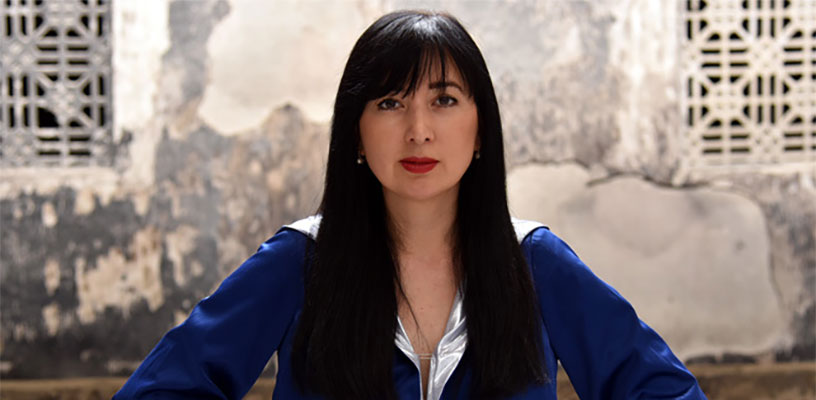Aziza Sadikova: Her Life and Music

Aziza Sadikova’s boundless creativity and multifaceted musical language form a universe of its own and has captivated musicians and audiences around the globe. Part of a profile series throughout March – Women’s History Month – in which we explore the lives, music, and inspirations of extraordinary composers from around the world. View more women composer profiles here.
Her Story
In recent years, Aziza Sadikova has established herself as a prominent composer, showcasing her talents across various musical genres. Her repertoire spans from composing chamber operas and orchestrating grand symphonies, to crafting intimate chamber pieces with delicate musical landscapes. Born in 1978 in Tashkent, Uzbekistan, Sadikova began taking piano and composition lessons at the age of five. She later studied organ and composition at the Royal Birmingham Conservatoire and completed her studies at the Trinity College of Music, London. Today, Sadikova lives in Germany in the inspiring cultural scene of its capital Berlin.
Sadikova’s music effortlessly traverses epochs, showcasing a distinct individual style characterised by complexity and a love for exploration. Overflowing with creativity, her compositions merge disparate stylistic influences, creating a dynamic and captivating musical experience. Conductor Omer Meir Wellber notes: “Aziza Sadikova uses a unique musical language which inexorably draws her listeners into her musical universe.”
Commissions from prestigious ensembles Gewandhausorchester Leipzig and the Philharmonic State Orchestra Hamburg mark significant milestones in Sadikova’s career. The Filarmonica Arturo Toscanini in Parma, Italy, appointed her as Composer in Residence for the 2022-23 season, presenting several world premieres, including the highly praised debut of Angelo di Fuoco conducted by Keri-Lynn Wilson. Ongoing commissions underscore Sadikova's position as one of the most compelling and sought-after voices in contemporary classical music.
Sadikova’s work has been honoured with prizes such as the Brandenburg Ministry of Education and Cultural Affairs Art Advancement Award and the European Composition Award. BBC World Service featured her in their TV documentary “100 Women”.
Her Sound
Sadikova's exploration of new musical frontiers spans a wide spectrum, from experimenting with unconventional instrumental techniques, to incorporating intricate structural and rhythmic elements. A Letter, 1921, Prague for piano four hands, video, and typewriter, serves as a prime example of her distinctive style. Sadikova is also influenced by the emotive depth of Romantic music, as showcased in Untitled(/cr/music/111264) for choir and orchestra and her Cello Concerto. Compositions such as Variation for piano quartet draw on neo-baroque textures. Several of Sadikova’s works are reimaginings of existing pieces e.g. Mirroring Contrapunctus.
Collaborators
Aziza Sadikova has worked with numerous ensembles and orchestras in Germany, including the Gewandhausorchester Leipzig, Die Deutsche Kammerphilharmonie Bremen, the Kammerakademie Potsdam, the Hamburg Philharmonic State Orchestra, members of the ensemble of the Staatsoper Unter den Linden, and the Junge Deutsche Philharmonie. Other collaborations have taken her to the VMU Chamber Orchestra in Lithuania, the Swedish Radio Symphony Orchestra, the BBC Philharmonic and the Britten Sinfonia (UK), Ensemble Nostri Temporis (Ukraine) and the Moscow Contemporary Ensemble.
Her music is championed by conductors such as Kent Nagano, Omer Meir Wellber and Jonathan Stockhammer. Renowned soloists as cellist Julian Steckel and percussionist Simone Rubino have premiered compositions by Aziza Sadikova.
Photo: Alexander Raevsky
